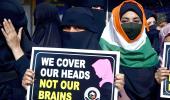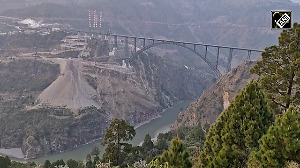'The wife will not only abuse her husband for giving her less money, but also abuse the government.'
'Look at the price of a cooking gas cylinder, it is Rs 1,200.'

Why did the Bharatiya Janata Party fare so badly in the Karnataka assembly elections?
The setback is particularly significant as it comes after a spectacular victory in the Gujarat assembly elections in December 2022 under BJP supremo Narendra D Modi's leadership.
When Modi arrived in Karnataka a fortnight before the assembly elections with his campaign blitzkrieg, it was expected that he would lead his party back to power in the only South Indian state the BJP was in power.
He did turn the election narrative around by chanting 'Jai Bajrang Bali' after the Congress was caught off-guard when its election manifesto mentioned that it would ban the Bajrang Dal on coming to power.
Modi then out of the blue promoted the controversial film The Kerala Story which sparked off a debate on love jihad amidst the election campaign.
In the end, none of these tactics worked and the Congress appears set to retake a state that has been its traditional stronghold.
Syed Firdaus Ashraf/Rediff.com asked Professor Muzaffar Assadi, dean of the faculty of arts, University of Mysore, for his assessment on the Karnataka election results.
How do you see the Congress victory in Karnataka?
Anti-incumbency against the BJP government was very strong from the beginning when the elections were announced.
Issues like corruption, communalism and inflation were strong factors working against the BJP.
But the main anti-incumbency against the BJP was the kitchen room.
Inflation in the kitchen room defeated the BJP in Karnataka.
Every commodity cost has escalated in the kitchen, which made it difficult for many families to manage their household budgets.
Combined with this main factor, all the rest -- anti-incumbency things -- accumulated against them.
So kitchen fire was the main reason for the anti-incumbency?
Kitchen fire is the first step towards anti-incumbency against any government.
A man earning Rs 30,000 cannot run his household under Rs 15,000 and save money too.
The wife will not only abuse her husband for giving her less money, but also abuse the government.
Look at the price of a cooking gas cylinder, it is Rs 1,200. It is too expensive.
Did the '40% corruption' tag campaign catch on with the voters? And was the BJP government really that corrupt as alleged by the Congress?
There were two kinds of anti-incumbency. One was at the state level and one was at the constituency level. And here the Congress played a brilliant role in catching the imagination of the public with slogans like 'paid' chief minister.
Another slogan, of 40 percent corruption, they kept alive in people's minds. People got trapped into this slogan and they convinced them they had to vote the BJP out.
This is the first time they used this strategy. They were very effective on the ground; the party also used social media well.
They played the caste equation well with alliances of Dalits, minorities and other backward castes. This was very effective in favour of the Congress in places like Old Mysore.
At the same time they split the votes of dominant castes like Lingayats whose vote got divided, as many Lingayats felt victimhood under BJP rule.
They also got a certain section of Vokkaliga community votes and their vote got divided among the three parties, the BJP, Congress and Janata Dal-Secular.
The Muslim vote was homogeneous and went to the Congress unlike last time when it was split. They too did not react to BJP politics and therefore the BJP could not sustain the communal argument.
Why did Modi's 'Jai Bajrang Bali' slogan not work?
This was the last resort by the BJP to win after the Congress wrote in its manifesto that it would ban the Bajrang Dal if it came to power.
But you have to remember the Bajrang Dal is powerful only in the coastal belt of Karnataka. In other parts of the state they tried to recite the Hanuman Chalisa in place like Bellary where Lord Hanuman is a very popular deity.
But here too out of five seats all five went to the Congress, thus showing that the 'Jai Bajrang Bali'' slogan did not work for the BJP.
What was wrong about the BJP's strategy?
They had two narratives for the Karnataka state election.
The first phase was when local leaders including the chief minister and former chief ministers concentrated on local issues by creating a political atmosphere for the BJP.
Later, BJP President J P Nadda came and so did Home Minister Amit Shah who said that they are the only ones who would scrap reservations for Muslims.
In the second phase, Prime Minister Modi came and he tried to emulate the same strategy that he adopted in Gujarat.
Roadshows, visit small towns to address people as he thought he will be able to turn the anti-incumbency in his party's favour.
He sent a message to the local people that he was the saviour of the people of Karnataka. And here, people started questioning his integrity as he visited 20 times during elections, but was absent during floods and drought in Karnataka.
The roadshow was orchestrated and everybody knew about it.
The last straw came when he did a roadshow in Bangalore which disrupted traffic when students had NEET exams. This sent a very wrong signal and he had to postpone his roadshow for the students.
Which regions did the Congress do well in?
Almost everywhere: Bellary and Chikmagaluru; the Hyderabad-Bombay region and Belgaum too they won. The only place the Congress did not do well was coastal Karnataka.
Who should take credit for this victory?
I think Congress leader Randeep Singh Surjewala said the Karnataka victory was because of Rahul Gandhi's Bharat Jodo Yatra, but I do not think so.
The Congress won only because local conditions helped them.
Rahul and Priyanka Gandhi did have an impact on voters, but as I said earlier, the anti-incumbency feeling was in-built before elections.
The organisation skill employed by (Karnataka Pradesh Congress Committee President) D K Shivakumar worked well for the party. He could break the ice for the Congress in Old Mysore, which is a strong Vokkaliga belt. Here, the Congress did well.
It was thought before this election that he (Shivakumar) would be confined to Kanakpura, but this was not seen in this election. Now, he is challenging (JD-S supremo, former prime minister and senior-most Vokkaliga leader H D) Deve Gowda's hegemony in the Old Mysore area.
He (Shivakumar) is a dashing leader and is fast replacing Deve Gowda and (H D) Kumaraswamy (former chief minister, Deve Gowda's son and JD-S president).
The number of seats for the Congress increased in the Old Mysore area.
So issues like the hijab ban did not work for the BJP?
It did not work.
Karnataka is different from Uttar Pradesh. It has a different history as we do not have a memory of Partition.
My immediate neighbour is not my neighbour, but my friend.











 © 2025
© 2025